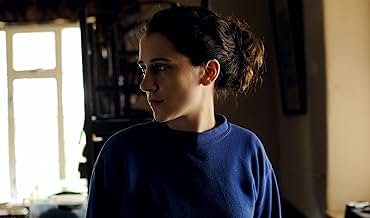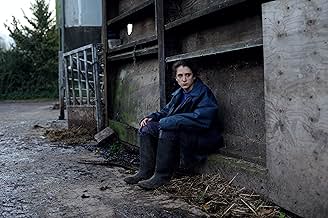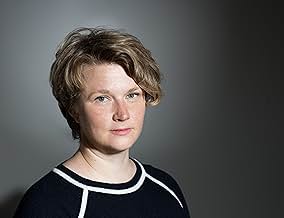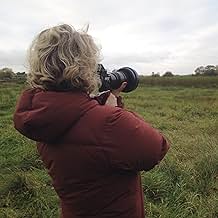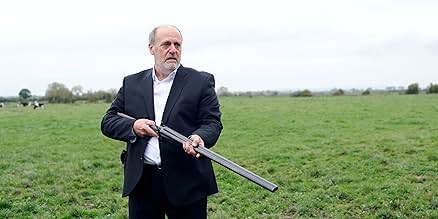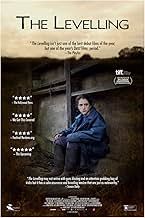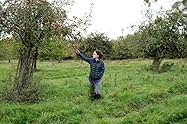IMDb-BEWERTUNG
6,4/10
2858
IHRE BEWERTUNG
Füge eine Handlung in deiner Sprache hinzuTrainee vet Clover Catto revisits family farm after brother's suicide. Confronts father over farm's disrepair and brother's death, uncovering family secrets and childhood revelations.Trainee vet Clover Catto revisits family farm after brother's suicide. Confronts father over farm's disrepair and brother's death, uncovering family secrets and childhood revelations.Trainee vet Clover Catto revisits family farm after brother's suicide. Confronts father over farm's disrepair and brother's death, uncovering family secrets and childhood revelations.
- Regie
- Drehbuch
- Hauptbesetzung
- Auszeichnungen
- 3 Gewinne & 6 Nominierungen insgesamt
Empfohlene Bewertungen
"The Levelling" is a film that was naturally melancholy with characters that had believable personalities. Artistically patient with a feeling of me spying on the characters in their quiet Somerset life.
This was a Drama in every form of the connotation. I felt the ratio for the gloom and melodrama didn't proportionately represent the problems and troubles we were being presented to on the screen. This was the hard sell for me. I feel this was more of a problem of it being a full feature film rather than a short film. To have the 1h23m time, they seemed to have built up the suspense of her brother's death as if some huge grand scheme was happening that she didn't know about while she was gone. It was difficult for me to really sympathize with the main character because I felt she had no real strings attached to the turmoil that she was in. She could of easily left and easy as she got in and there was no prior or present time introduction to strengthen how much her brother's death meant to her.
It did do a good job showing the hardships of catastrophe, disasters, and small mishaps that can shape our lives and change how we address people; even the ones we love.
It was a good film, nothing to write home about and all the actors played their part as intended. It would not be worth a watch more than once and if you are into dramas that actually show the shaping of character development, this is worth the time.
This was a Drama in every form of the connotation. I felt the ratio for the gloom and melodrama didn't proportionately represent the problems and troubles we were being presented to on the screen. This was the hard sell for me. I feel this was more of a problem of it being a full feature film rather than a short film. To have the 1h23m time, they seemed to have built up the suspense of her brother's death as if some huge grand scheme was happening that she didn't know about while she was gone. It was difficult for me to really sympathize with the main character because I felt she had no real strings attached to the turmoil that she was in. She could of easily left and easy as she got in and there was no prior or present time introduction to strengthen how much her brother's death meant to her.
It did do a good job showing the hardships of catastrophe, disasters, and small mishaps that can shape our lives and change how we address people; even the ones we love.
It was a good film, nothing to write home about and all the actors played their part as intended. It would not be worth a watch more than once and if you are into dramas that actually show the shaping of character development, this is worth the time.
Carson Robison sang it, farming is not for the faint-hearted. "The cow's gone dry and the hens won't lay, troubles pile up day by day. Grief and misery, pains and woes, debts and taxes, and so it goes."
There are parts of the world where farm output is measured in thousands of litres per week, but these rain-soaked acres in England ain't it. The flood of a few months ago made things a lot worse, but was this a viable dairying unit in the first place? Get rid of those cows, cut in some PVC field drainage with geotextile. Barley is used to make alcoholic beverages, muesli contains lots of oats.
Agriculture, emotional attachment, strained relationships and mental health issues - maybe they used to go together, but this combination was coming to rely increasingly on subsidies from the European Union. Is "The Levelling" about farming, or is it about a dysfunctional family who live on a farm? The technology doesn't seem to be much advanced on what was available in the 1930s. In this twenty-first century the cold-blooded business of converting soil fertility and sunshine into milk solids and butterfat entails zapping barcodes on ear-tags, uploading iPad data into laptops, and responding to endless on-line demands from government departments for information. And taxes.
In this film, family is everything, but when members of a family fall out, they're quite likely never to speak to each other again. We're simply expected to accept this dynamic, like it's a raw Scandinavian saga. It's something to do with the unforgiving land, and the malicious weather.
Aubrey the father (David Troughton) hands over the farm to his son to manage. Surely a poisoned chalice. Then the son kills himself. Clover (Ellie Kendrick) is about to complete her university qualifications in veterinary science, but she has to come back - to sort stuff out? Too many things don't make enough sense. The viewer is expected to fill in causes and effects. A cryptic crossword with ambiguous clues.
I hope "The Levelling" doesn't put young Britishers off farming. But you gotta love the land. Love it enough to compensate for the fact that the land does not love you. The land would rather be covered in forest, with squirrels and badgers.
There are parts of the world where farm output is measured in thousands of litres per week, but these rain-soaked acres in England ain't it. The flood of a few months ago made things a lot worse, but was this a viable dairying unit in the first place? Get rid of those cows, cut in some PVC field drainage with geotextile. Barley is used to make alcoholic beverages, muesli contains lots of oats.
Agriculture, emotional attachment, strained relationships and mental health issues - maybe they used to go together, but this combination was coming to rely increasingly on subsidies from the European Union. Is "The Levelling" about farming, or is it about a dysfunctional family who live on a farm? The technology doesn't seem to be much advanced on what was available in the 1930s. In this twenty-first century the cold-blooded business of converting soil fertility and sunshine into milk solids and butterfat entails zapping barcodes on ear-tags, uploading iPad data into laptops, and responding to endless on-line demands from government departments for information. And taxes.
In this film, family is everything, but when members of a family fall out, they're quite likely never to speak to each other again. We're simply expected to accept this dynamic, like it's a raw Scandinavian saga. It's something to do with the unforgiving land, and the malicious weather.
Aubrey the father (David Troughton) hands over the farm to his son to manage. Surely a poisoned chalice. Then the son kills himself. Clover (Ellie Kendrick) is about to complete her university qualifications in veterinary science, but she has to come back - to sort stuff out? Too many things don't make enough sense. The viewer is expected to fill in causes and effects. A cryptic crossword with ambiguous clues.
I hope "The Levelling" doesn't put young Britishers off farming. But you gotta love the land. Love it enough to compensate for the fact that the land does not love you. The land would rather be covered in forest, with squirrels and badgers.
Hope Dickson-Leach's film 'The Levelling' tells the bleak story of Clover, a young vet (and farmer's daughter), who returns hometo her depressed, irrational father after the suicide of her brother. The personal drama is convincing, but leaves you thinking that her sibling might have had the best of it. The acting (from David Troughton and Ellie kendrick in the lead roles) is better than the plot, which is devoid any sense of the possibility of hope; instead, we watch the final chapter of a family, already broken, finally falling apart. Some counter-balanacing elements to the story would not have gone amiss.
Clover, a veterinary student returns to the family farm following a bereavement in the family. Her father is struggling with grief over far more than this latest loss, having given up a military career to take over the farm decades earlier.
Death stalks the story as Clover's relationship with her father, mother, brother and even family dogs is explored. I almost had a feeling of in amongst the action, learning about real people through meeting them and picking up pieces of the jigsaw from each in turn. The story is so convincing that I could imagine it being filmed sequentially, with the actors learning plot twists just as we do.
Watching critically, there were perhaps two occasions when characters reacted in ways I had not expected, but I realised that they were correct and it was my anticipation that was wrong. Every revelation was something long known about but ignored or repressed. The jolt of parts falling into place was tangible; not just Clover but Aubrey and James too made discoveries about themselves and others around them.
There was minimal theatricality. Characters came and went with no introductions or explanations. Helen's character was a tiny joy, a gem of a part. The weakest character was the vicar arranging the funeral. I understand why it was necessary, but I would expect her to lead parishioners to their own conclusions, not trot out some amateur psychology. Her limited screen time would have had to be much longer to accommodate that.
Death, mud, decay, rain and stoic acceptance of tragedy run as constant themes. Images of hares play the role performed by background music in lesser films, with one swimming, then sinking lifelessly, only for the closing shot to be a hare running in the inevitable rain. No easy answers in this film, but an astonishingly brave exercise in respecting the audience to fill gaps rather than having the script explain everything.
I would be interested to know whether Hope Dickson Leach had the idea already and the real flood was a fortuitous coincidence, whether it was a hastily put together (probably largely improvised) story in response to the damage, or some other combination of theme and natural circumstance.
Death stalks the story as Clover's relationship with her father, mother, brother and even family dogs is explored. I almost had a feeling of in amongst the action, learning about real people through meeting them and picking up pieces of the jigsaw from each in turn. The story is so convincing that I could imagine it being filmed sequentially, with the actors learning plot twists just as we do.
Watching critically, there were perhaps two occasions when characters reacted in ways I had not expected, but I realised that they were correct and it was my anticipation that was wrong. Every revelation was something long known about but ignored or repressed. The jolt of parts falling into place was tangible; not just Clover but Aubrey and James too made discoveries about themselves and others around them.
There was minimal theatricality. Characters came and went with no introductions or explanations. Helen's character was a tiny joy, a gem of a part. The weakest character was the vicar arranging the funeral. I understand why it was necessary, but I would expect her to lead parishioners to their own conclusions, not trot out some amateur psychology. Her limited screen time would have had to be much longer to accommodate that.
Death, mud, decay, rain and stoic acceptance of tragedy run as constant themes. Images of hares play the role performed by background music in lesser films, with one swimming, then sinking lifelessly, only for the closing shot to be a hare running in the inevitable rain. No easy answers in this film, but an astonishingly brave exercise in respecting the audience to fill gaps rather than having the script explain everything.
I would be interested to know whether Hope Dickson Leach had the idea already and the real flood was a fortuitous coincidence, whether it was a hastily put together (probably largely improvised) story in response to the damage, or some other combination of theme and natural circumstance.
10balagesh
Levelling means working away the unevenness of the ground. But I had a feeling that there was another meaning in psychology. I found this, " Leveling is when people keep out parts of stories and try to tone those stories down so that some parts are excluded." (Wiki) I think this is the key to understanding film. Our protagonist returns home for his brother's funeral and has to decipher what has happened over the past few months. It's a fascinating investigation. And through the grieving process and the rather complex parent-child relationship, we get a multi-layered story.
The protagonist (and it doesn't matter her gender; in the story it doesn't matter that she is the girl of the two children) is thrown back into her past. I really liked the way the behaviour of the educated and self-conscious woman who is about to become a vet is replaced, even in a single scene, by that of a vulnerable but strong little girl.
The protagonist (and it doesn't matter her gender; in the story it doesn't matter that she is the girl of the two children) is thrown back into her past. I really liked the way the behaviour of the educated and self-conscious woman who is about to become a vet is replaced, even in a single scene, by that of a vulnerable but strong little girl.
Wusstest du schon
- WissenswertesOn the BBC News channel review of the year in film in 2017, critic Mark Kermode named this as his favourite British film of the year.
- PatzerWhen they are preparing to eat shepherd's pie, Aubrey says 'Do you want a drink James?' but when James refuses Aubrey says 'Oh come on Harry. Don't be such a girl.'
- Soundtracks13 Angels Standing Guard 'Round The Side of Your Bed
Performed & written by Thee Silver Mt Zion (as A Silver Mt. Zion)
Published by Rough Trade Records
Courtesy of Constellation
Top-Auswahl
Melde dich zum Bewerten an und greife auf die Watchlist für personalisierte Empfehlungen zu.
- How long is The Levelling?Powered by Alexa
Details
Box Office
- Budget
- 1.000.000 £ (geschätzt)
- Bruttoertrag in den USA und Kanada
- 3.040 $
- Eröffnungswochenende in den USA und in Kanada
- 160 $
- 26. März 2017
- Weltweiter Bruttoertrag
- 118.451 $
- Laufzeit1 Stunde 23 Minuten
- Farbe
- Seitenverhältnis
- 2.35 : 1
Zu dieser Seite beitragen
Bearbeitung vorschlagen oder fehlenden Inhalt hinzufügen





